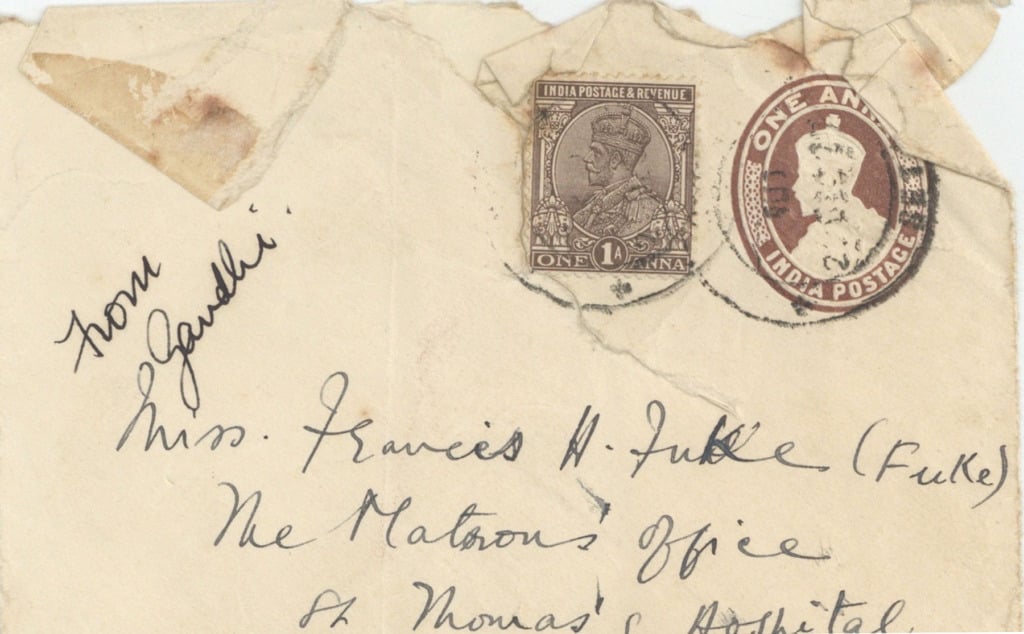Gandhi Aims to Advise a Nurse Who Wanted to Help the Poor and Underprivileged and Aid in Their Medical Care



Gandhi had wanted to become a doctor and never lost his interest in medicine
- Currency:
- USD
- GBP
- JPY
- EUR
- CNY
“I cannot think of anything better than that you should attach yourself to some hospital where you could easily come in contact with those whom you have in view.”
This letter links Gandhi’s lifelong interest in medical care with his desire to improve the lot of average citizens
Though Gandhi’s role...
“I cannot think of anything better than that you should attach yourself to some hospital where you could easily come in contact with those whom you have in view.”
This letter links Gandhi’s lifelong interest in medical care with his desire to improve the lot of average citizens
Though Gandhi’s role and contributions to the political arena are well known, what is less known is his contributions towards health. Not many people are aware that he was interested in studying medicine and wanted to become a medical practitioner. There were two pivotal moments in his life: in 1888 and in 1908–09, when Gandhi wanted to earn a medical degree and become a doctor. In 1888, when he was 18 years old, young Mohandas Karamchand Gandhi wanted to go to England to study medicine. His brother suggested instead, it would be wiser to study law and become a barrister, which is what Gandhiji did.
Later though, even as he practiced law, Gandhi continued thinking about visiting London to study medicine. He didn’t end up pursuing medicine but that didn’t diminish his interest in health and working for the sick and the poor. His interest in health, hygiene, nutrition and diseases was as great as his interest in politics. Throughout his life, Gandhiji nursed the ailing and there is plenty of evidence to show that he wanted to be a doctor more than he wanted to be a lawyer.
This letter is the only one of Gandhi we can recall seeing that manifested his interest in medicine. On September 26, 1927, Miss Frances H. Luke, an educated Englishwoman who was the Matron (chief nurse) at London’s St. Thomas’s Hospital, wrote to Gandhi saying that she wanted to serve the downtrodden and the untouchables. She had previously visited Gandhi’s ashram, and met with Gandhi.
Typed letter signed, from “The Ashram” in Sabarmati, December 20, 1927, to Miss Luke in the Matron’s office at St. Thomas’s Hospital, saying that her nursing work in the hospital would appropriately serve her goal of service. “I have your letter. I cannot think of anything better than that you should attach yourself to some hospital where you could easily come in contact with those whom you have in view. I remember your visit to the Ashram.
“I am traveling just now and I have no photograph such as you want. You may not know that during recent years I have never sat for a photograph, but of course there are many snapshots available in the bazaar.” Gandhi has made a few handwritten corrections to the text of the letter, in addition to adding a total of 10 words. Accompanied by the original mailing envelope.
Here Gandhi shows that his belief in the importance of medical assistance to the poor and underprivileged.

Frame, Display, Preserve
Each frame is custom constructed, using only proper museum archival materials. This includes:The finest frames, tailored to match the document you have chosen. These can period style, antiqued, gilded, wood, etc. Fabric mats, including silk and satin, as well as museum mat board with hand painted bevels. Attachment of the document to the matting to ensure its protection. This "hinging" is done according to archival standards. Protective "glass," or Tru Vue Optium Acrylic glazing, which is shatter resistant, 99% UV protective, and anti-reflective. You benefit from our decades of experience in designing and creating beautiful, compelling, and protective framed historical documents.
Learn more about our Framing Services











































































































